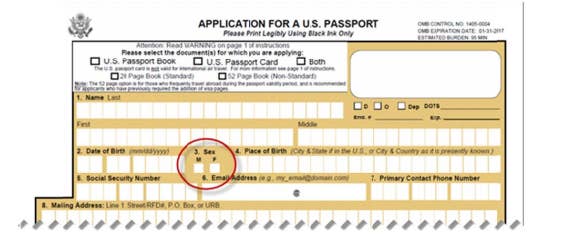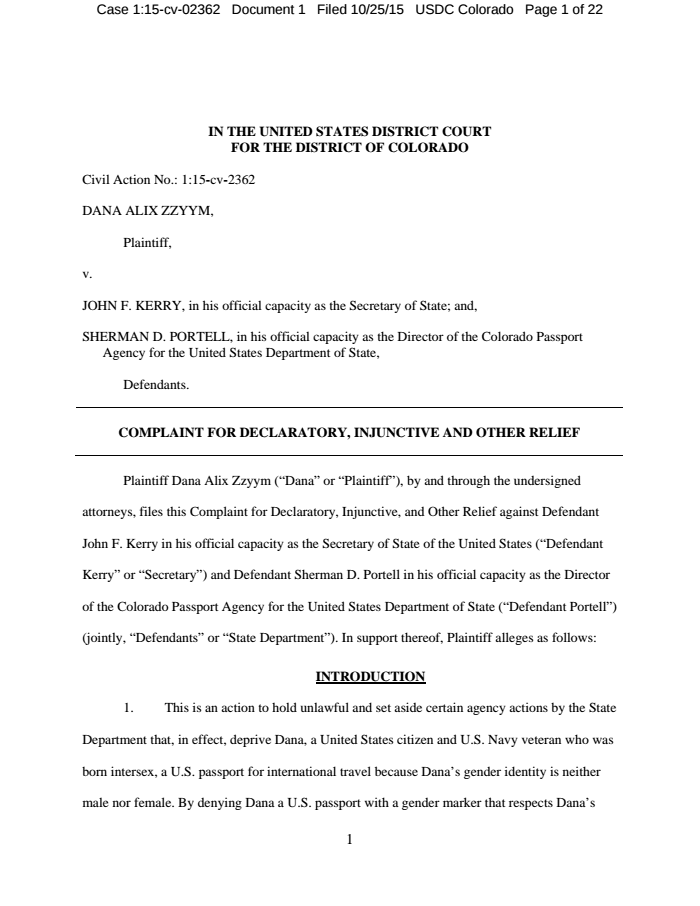
Dana Zzyym has spent most of their life struggling to conform to social and legal categories of gender. But now Zzyym is claiming the State Department violated their constitutional rights when it denied them a U.S. passport last year for failing to pick either a male or female gender box.
Lambda Legal, an LGBT civil rights group, filed a lawsuit Monday on Zzyym’s behalf claiming that the State Department and Colorado Passport Agency locked “Dana within the confines of our nation’s borders with no legal means to depart the United States” because it does not recognize gender identity beyond male and female.
The suit said the State Department violated the Fifth Amendment of the Constitution, which guarantees that no one "be deprived of life, liberty, or property, without due process of law" and the Equal Protection Clause of the Fourteenth Amendment, which protects people from discrimination based on sex.
The department discriminated against Zzyym in this case by denying them a passport with a gender marker other than "M" or "F," which is a "sex-based consideration," the lawsuit argues. This then denied Zzyym's right to freely travel, which is a right given to other people who identify as either male or female, they argue.
“The U.S. government is forcing individuals who are neither male or female from accurately being able to affirm their identity,” said Lambda Legal staff attorney Paul Castillo told BuzzFeed News. “So they’re telling Dana they have to choose between who they are and their ability to travel, but they shouldn’t have to choose.”
The State Department denied Zzyym’s request because it requires the sex field to be listed as either “M” or “F,” according to the complaint. It later denied Zzyym’s request that the department review its decision to deny their request to be listed as “X,” saying in a letter in April that the decision was final, according to court documents.
Zzyym, 57, was born with ambiguous genitalia. Zzym's parents listed their gender as blank on the birth certificate as Zzym underwent painful and irreversible surgeries to pass as male.
Despite the medical treatment, the family was silent on the issue.
“My parents never talked about it,” said Zzyym. “I had to discover it on my own.”
Over four decades, Zzyym, a Navy veteran, fought to understand their gender in a world that required them to choose between either male or female. They experimented with a female gender at one point, even undergoing surgery to have female genitalia, and legally changed their name from Brian Orin Whitney to Dana Alix Zzyym.
By 2011 Zzyym came to terms with being intersex. In 2012 Zzyym changed their birth certificate from “male” to “unknown.”

Since then, Zzyym has worked as an intersex activist through their role as associate director of the Organization Intersex International’s U.S. affiliate, one of the world’s leading intersex advocacy groups.
In 2014, they were invited to an international LGBTI conference in Mexico City to represent their organization chapter. Zzyym drove to their nearest passport agency in Denver, Colorado with their application, birth certificate, driver’s license, photo, fee, and letter explaining that they are neither male or female. Instead, they asked to use “X” as the marker in the sex field of the passport.
The State Department declined to comment to BuzzFeed News because the lawsuit is pending.
The department recently started to accept passport applications from transgender travelers who have not undergone sexual reassignment surgery. But the question of a gender option for intersex people still remains open.
Castillo says that the lawsuit raises the question of whether gender should continue to be required to confirm someone’s identity. Zzyym gave the State Department other materials including their birth certificate and documentation from the Veterans Affairs office, which Castillo says could have been used to verify Zzyym’s identity.
The department has other mechanisms at hand to confirm a traveler’s identity, including the United Nations' International Civil Aviation Organization standards for machine-readable travel documents which accepts an “X” gender mark.
“Foreign nationals who have the X marker on their passports are permitted to enter U.S. and yet we’re denying the same rights to own citizens,” said Castillo. “When you are allowing foreign nationals more rights than you do your own citizens with respect to the same document, there has to be something wrong.”
Several countries issue passports with alternative gender markers to "M" or "F," including Australia, India, Malta, Nepal, Germany and New Zealand.
"This is something I believe every other intersex and non binary person has a right to do," said Zzyym. "This is the right thing for me to do. I think everybody is born trying to make the world a better place and this is what I need to do."
Read the complaint:

